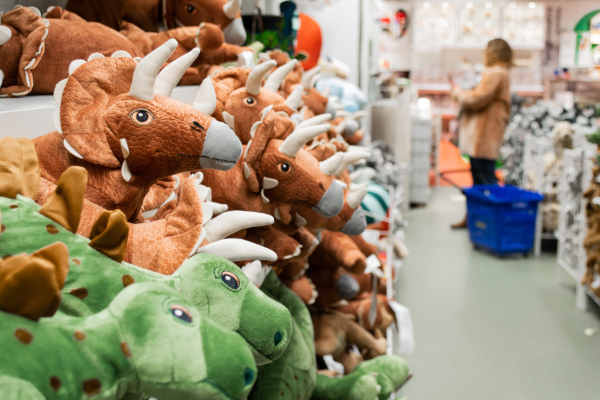Despite shaky economic conditions heading into the new year, the 2023 holiday retail season is shaping up to be jolly.
The National Retail Federation expects holiday spending to reach record levels during November and December, growing between 3% and 4% over 2022 to between $957.3 billion and $966.6 billion. A slower growth rate compared with the past three years, when trillions of dollars of stimulus led to unprecedented rates of retail spending, but consistent with the average annual holiday increase of 3.6% from 2010 to 2019.
Strong imports of toys and Christmas-related goods support this prediction, reaching similar pre-pandemic levels. While toy imports are down nearly 30% year-to-date, they are at the same level as 2019, according to dat presented by Jason Miller, supply chain professor at Michigan State University. This data shows metric tons of containerized waterborne imports from the world to the U.S. for the first 9 months of each year back to 2003.
“This suggests importers are still expecting strong spending on toys this holiday season,” he said.
Miller also noted that “these strong imports have occurred during a time where retailers and wholesalers have broadly been moving to right-size inventories after accumulating excessive stocks in the first half of 2022.”
Imports of Christmas-related merchandise are also promising this year, reaching the second-highest level since 2003 in terms of metric tonnage.
These numbers are great news for a retail industry that has been threatened by economic headwinds, such as high interest rates, inflation, and a less-than-stellar housing market. Despite these pressures, it appears retail will not yet repeat the hardships of the 2008 holiday season.
“It should be emphasized just how much imports of both of these product categories plunged in 2008 and 2009 during the global financial crisis,” said Miller. “This makes perfect sense because we saw a sharp decline in retail sales over this period. Clearly, this year is different, and maybe another sign that importers aren’t seeing signs of a dramatic slowdown in consumer spending materializing.”
And while it appears retailers’ spirits are high, the predicted demand from consumers can still be easily impacted before year’s end.
“Consumers remain in the driver’s seat, and are resilient despite headwinds of inflation, higher gas prices, stringent credit conditions, and elevated interest rates,” said NRF Chief Economist Jack Kleinhenz. “We expect spending to continue through the end of the year on a range of items and experiences, but at a slower pace. Solid job and wage growth will be contributing factors this holiday season, and consumers will be looking for deals and discounts to stretch their dollars.”
SC
MR


Latest Supply Chain News
- Made in Mexico, manufactured by China
- Retail sales see gains in October, reports Commerce and NRF
- Balancing green and speed: Home delivery insights from the pandemic era
- AdventHealth named top healthcare supply chain by Gartner
- Geopolitical readiness in supply chains: Strategic challenges for leaders
- More News
Latest Podcast

 Explore
Explore
Procurement & Sourcing News
- Made in Mexico, manufactured by China
- Retail sales see gains in October, reports Commerce and NRF
- Geopolitical readiness in supply chains: Strategic challenges for leaders
- With capacity to spare, logistics real estate demand remains subdued
- Tariffs, taxes and trade: The impact of Trump’s reelection on the supply chain
- How to improve demand forecasts for new product families
- More Procurement & Sourcing
Latest Procurement & Sourcing Resources

Subscribe

Supply Chain Management Review delivers the best industry content.

Editors’ Picks




